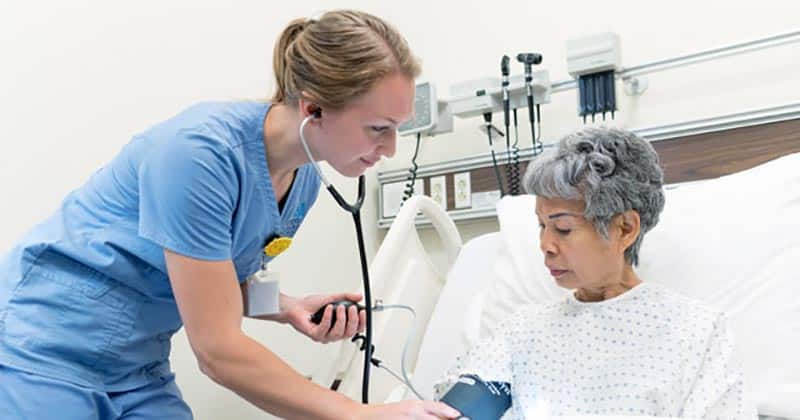In Australia, a Certificate of Nursing typically refers to a Graduate Certificate of Nursing. This is a postgraduate course of study for degree-qualified registered nurses. It allows them to specialise in specific areas of nursing.
The qualification enhances professional capabilities. It also prepares nurses for advanced roles in healthcare. Courses usually span one semester of full-time study or can be extended over eight months part-time. Example specialisations are mental health nursing, emergency nursing, and critical care.
Nursing is a field where TAFE certificates do not play a major role. Becoming a nurse is typically achieved by completing a university degree. You can also become an enrolled nurse by doing a Diploma of Nursing. Postgraduate certificates are important to specialising and gaining and demonstrating expertise.
Meaning of Nursing Certification
Nursing certification in Australia is a mark of advanced expertise for registered nurses who wish to develop further in their careers. Certification is generally achieved by postgraduate study leading to a Graduate Certificate in Nursing.
Certification represents a commitment to professional development. It also indicates mastery in a specific area of nursing. Certified nurses are recognised for their advanced competencies. They often provide higher quality patient care.
What Is a Graduate Certificate in Nursing?

A Graduate Certificate in Nursing is an advanced academic qualification. It’s designed for registered nurses. The course provides specialised knowledge and skills and typically is embedded within a larger Masters in Nursing university program.
The course structure typically includes four subjects. These focus on advanced practice areas in nursing. The course can be earned relatively quickly and is just one-third the length of a master’s degree. It’s often done in one semester of full-time study or over eight months part-time. This makes it a convenient option for working professionals.
Any Graduate Certificate from an Australian university ranks as Level 8 on the Australian Qualifications Framework (AQF). This positions it higher than a Bachelor’s degree, which is at Level 7. It holds the same academic standing as a Bachelor (Honours) and a Graduate Diploma. The only higher qualifications are a Master’s degree at Level 9 and a Doctorate at Level 10.
Specialisations

A wide selection of specialisations are available in nursing graduate certificate courses. Each focuses on a unique aspect of nursing, often on specific patient care needs. For instance, mental health nursing focuses on psychological well-being. Critical care nursing deals with life-threatening conditions.
The choice of specialisation depends on the nurse’s interest and career goals, though it should normally be relevant to their current roles. Specialising allows nurses to provide more focused and effective care. Here are the top nursing certifications in Australia according to a study by Lerna Courses.
Mental Health Nursing
Certification in Mental Health Nursing signifies expertise in supporting patients with psychological conditions. Job opportunities include mental health nurse and mental health counsellor, with an emphasis on continued learning for career advancement.
Emergency Nursing
Emergency Nursing courses prepare nurses for roles in emergency departments. Career prospects include emergency nurse and trauma nurse, in a field marked by high demand and challenging work environments.
Critical Care Nursing
A qualification in Critical Care Nursing opens doors to roles in intensive care units. This specialisation leads to positions like critical care nurse and nursing manager, involving high-stress and emotionally taxing situations.
Clinical Nursing
A Clinical Nursing certificate enhances prospects for roles in clinical governance and advanced patient care. Graduates often progress to positions such as clinical nurse specialist and clinical educator.
Perioperative Nursing
Perioperative Nursing study readies nurses for roles in surgical care. Job opportunities range from surgical support to surgery coordination, crucial in settings with high surgical volumes.
Nursing Education
Certification in Nursing Education leads to roles in healthcare education and training. Graduates find positions as clinical nurse educators and training coordinators, with a focus on professional development.
Acute Care
Acute Care certification increases employability in hospital settings, particularly for handling short-term health episodes. It’s valued for its versatility in acute care nursing roles.
Advanced Nursing
Advanced Nursing programs cover a range of specialty fields. This study area offers diverse career prospects depending on the chosen specialty, from clinical practice to managerial roles.
Paediatric Nursing
A certificate in Paediatric Nursing prepares nurses for specialised roles in children’s healthcare. Career paths include paediatric nurse specialist and child health nurse, focusing on addressing unique health needs of children.
How to Become a Clinical Nurse Specialist

To become a Clinical Nurse Specialist (CNS) in Australia, nurses must first be registered. They then need to pursue a Graduate Certificate in Nursing. This qualification should be in a job-relevant specialisation.
Nurses also need to gain experience in their specialty area, demonstrating advanced nursing skills in that field. Developing specific expertise is crucial.
A CNS is expected to have deep knowledge in their specialty. They also need strong clinical and leadership skills. Continuous professional development is important. This ensures the CNS stays up-to-date with the latest practices in nursing.
